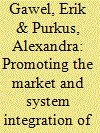| Srl | Item |
| 1 |
ID:
101406


|
|
|
|
|
| Publication |
2011.
|
| Summary/Abstract |
Development and diffusion of new renewable energy technologies play a central role in mitigating climate change. In this context, small-scale deep geothermal power has seen growing interest in recent years as an environmentally friendly, non-intermittent energy source with large technical potential. Following the first successful demonstration projects, the German geothermal industry is currently experiencing an internationally unparalleled growth. In this study we explore the factors driving this development, and the role geothermal power production could play in the future of the German electricity market. For this, we apply the scenario technique, based on literature analysis and interviews with companies operating actively in the field. Our findings highlight the importance of political support and framework conditions in the electricity market, with the best prospects in a decentralised energy system based on renewable energy sources, where high investment costs and the risk of discovery failure are balanced by the benefits of low-carbon base load power.
|
|
|
|
|
|
|
|
|
|
|
|
|
|
|
|
| 2 |
ID:
125553


|
|
|
|
|
| Publication |
2013.
|
| Summary/Abstract |
With the share of renewable energies within the electricity sector rising, improving their market and system integration is of increasing importance. By offering plant operators a premium on top of the electricity market price, premium schemes represent an option to increase the alignment of renewable electricity production with market signals, and have been implemented by several EU member states. This paper examines the case study of the German market premium scheme adopted in 2012. Building on an evaluation of early experiences, we discuss whether the market premium contributes to the aims of market and/or system integration (effectiveness), and what potential efficiency gains and additional costs of "administering integration" are associated with it (efficiency). While exposing renewables to price risks is not the scheme's purpose, it has successfully increased participation in direct marketing. However, risks of overcompensating producers for marketing and balancing costs are high, and the benefits of gradually leading plant operators towards the market are questionable. Incentives for demand-oriented production are established, but they seem insufficient particularly in the case of intermittent renewable energy sources. To conclude, we provide an outlook on alternative designs of premium schemes, and discuss whether they seem better suited for addressing the challenges ahead.
|
|
|
|
|
|
|
|
|
|
|
|
|
|
|
|